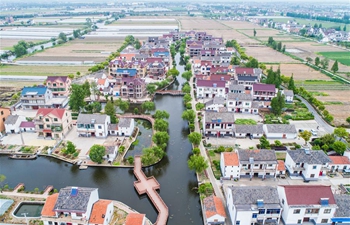STRASBOURG, France, March 29 (Xinhua) -- With Brexit negotiations still in disarray and European elections coming in May, the European Parliament set environmental concerns at the top of its agenda during the its plenary session this week in Strasbourg, targeting plastic waste, carbon dioxide emissions and drinking water safety.
Strict new copyright rules on internet content were also backed by Members of European Parliament (MEPs), though the plenary agenda focus on environmental questions showed the concerns of the parliament.
SINGLE-USE PLASTICS
To spearhead a push against plastic litter, MEPs voted overwhelmingly on Wednesday to ban single-use plastics such as plates, cutlery, straws and the sticks used in cotton buds. According to European Commission statistics, these products make up 70 percent litter in the world's oceans, of which 80 percent is plastics.
The legislation set a target for member states to collect 90 percent of plastic bottles by 2029, and plastic bottles will have to include at least 25 percent recycled content by 2025, increasing to 30 percent by 2030.
According to Frederique Ries, lead MEP on the legislation, the move will reduce the cost of environmental damage by 22 billion euros (24.7 billion U.S. dollars), which is the estimated cost of plastic pollution by 2030.
Separately, MEPs on Thursday backed plans that promoted the improvement of European tap water in order to lower costs and cut down on plastic bottle waste.
Carbon dioxide emissions were also on the plenary agenda, as the European Parliament backed plans to set new reduction targets of 37.5 percent for new cars and 31 percent for new vans by 2030.
The plans, already agreed upon on informal negotiations with European Union ministers, will also require the European Commission to study the social impacts of the low-carbon transition, as workers in traditionally high-carbon industries need retraining and support.
MEPs also dealt with emissions by backing a call for dealing with the existing fleet of vehicles, including support for a mandatory hardware retrofit by manufacturers for highly polluting vehicles, when they are not recalled or withdrawn altogether.
In this follow-up to the Dieselgate scandal, in which major German automotive manufacturers were found to be tampering with emissions tests, the parliamentarians criticized the European Commission for "obstructive behavior" in the procedures launched since the scandal broke.
COPYRIGHT RULES ONLINE
The European Parliament voted Tuesday in favor of stronger copyright rules for the internet in a bid to give a stronger position to content creators, while maintaining certain safeguards for freedom expression and nourishing fledgling enterprises.
Under the new directive, internet platforms would be liable for user-generated content, and content producers themselves, especially musicians and authors, will have stronger rights to negotiate for remuneration. In this way, tech giants will be required to share revenues with content creators, including additional remuneration when the amount originally agreed upon is disproportionally low to the benefits received by the distributor.
Journalists will also have stronger rights over the use of their work online, including when news aggregator republishes stories. Links that include "snippets" of articles will still be allowed, however.
Exceptions to the rules include protections for freedom of expression, notably with both internet memes and GIFs formally excluded from the legislation. Copyrighted content is also fair use for teaching and illustration.
To protect young and innovative business, the rules will be less strict on start-ups, but non-commercial online encyclopedias and open source software platforms will also be excluded from the directive.
To go into force, the directive will need to be adopted by European Union member states. Once adopted, the directive will enter into force two years after its publication in the official journal of the EU, giving member states time to adapt existing legislation.
SECURITY AND DEVELOPMENT
Security of European borders remained on the agenda, even if the migration crisis has ebbed since its peak in 2015, when over a million people arrived on European soil. MEPs backed new rules Thursday to reform the European Border and Coast Guard, to address current needs and shortcomings, while planning for future development.
A new standing corps of 10,000 new border and coast guards will be set up by 2027. The new corps could, when requested by a member state, handle border control and return tasks, and also fight cross-border crime.
Security concerns were also met with European development goals, including new focuses on regions and cities in cohesion funding, and investment in the European study program Erasmus+.
For the study program, which benefited almost 800,000 people in 2017 according to the European Commission, MEPs voted to triple the budget for 2021-2027.
Other decisions and debates of note included the European Parliament's support to end the time switch between summer and winter, and which could lead to 2021 being the last year of a seasonal time change for the EU.













